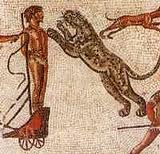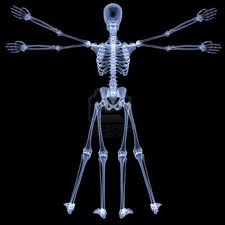The Offense of Christ
 Wednesday, July 23, 2014 at 07:42AM
Wednesday, July 23, 2014 at 07:42AM  Matthew 11:1-6 And it came to pass, when Jesus had made an end of commanding his twelve disciples, he departed thence to teach and to preach in their cities. 2 Now when John had heard in the prison the works of Christ, he sent two of his disciples, 3 And said unto him, Art thou he that should come, or do we look for another? 4 Jesus answered and said unto them, Go and shew John again those things which ye do hear and see: 5 The blind receive their sight, and the lame walk, the lepers are cleansed, and the deaf hear, the dead are raised up, and the poor have the gospel preached to them. 6 And blessed is he, whosoever shall not be offended in me.
Matthew 11:1-6 And it came to pass, when Jesus had made an end of commanding his twelve disciples, he departed thence to teach and to preach in their cities. 2 Now when John had heard in the prison the works of Christ, he sent two of his disciples, 3 And said unto him, Art thou he that should come, or do we look for another? 4 Jesus answered and said unto them, Go and shew John again those things which ye do hear and see: 5 The blind receive their sight, and the lame walk, the lepers are cleansed, and the deaf hear, the dead are raised up, and the poor have the gospel preached to them. 6 And blessed is he, whosoever shall not be offended in me.
John 16:1 These things have I spoken unto you, that ye should not be offended.
Psalm 119:165 Great peace have they which love thy law: and nothing shall offend them.
There is undoubtedly not a person alive or dead who has not been offended at some point in life. Someone has called you a name; someone has criticized you; someone has disrespected you; someone has falsely accused you. Maybe you have been hurt by a racial slur. Maybe you have been branded as a rebel, a perverted person, or someone worthy of disdain. The old saying that our parents taught us about sticks and stones went down the tubes a long time ago.
Sometimes, it depends on who offends you. It is easy to brush off an offense committed by a stranger. It is harder to ignore an offense against you by someone you know. It is hardest to deal with an offense committed by someone you love. These are the kinds of offenses that incite a reaction—sometimes an act of violence. When someone you love offends you deeply, it can end a relationship, lead to divorce, or many times it has resulted in murder.
When Cain felt he was disrespected by Abel, he killed him.
When Amnon violated his own sister, Absalom hunted him for two years and finally had him killed.
When the Haman thought Mordecai insulted him and the king, he orchestrated a plot to hang him.
In our socially turbulent times, we deal with an over-the-top reaction to offenses through what we call political correctness. Offensive people have been court ordered to undergo sensitivity training. We have seen a number of laws passed that outlaw “hate speech.” We hear references to the “thought police.” Just recently, the NFL Team Washington Redskins has been told they can no longer use the team name “Redskins” because it is offensive to native Americans. A high school student was reprimanded for including a reference to “Jesus Christ” in his graduation speech. Whether you agree with any of these things or not, it still points up the visceral human reaction that many people have to being offended. We don’t like it.
John the Baptist, the forerunner of Christ, was a good man. He preached a gospel of repentance, he had disciples and followers, and he baptized his converts to the message of repentance. Yet, for all his goodness and right intentions, he was denied the spotlight. The Apostle John wrote about him:
John 1:6-8 6 There was a man sent from God, whose name was John. 7 The same came for a witness, to bear witness of the Light, that all men through him might believe. 8 He was not that Light, but was sent to bear witness of that Light.
Think for a moment how John must have felt. He was a prophet. He lived a sacrificial life, camping out in the wilderness, eating locusts and wild honey, despised by the religious people and the hierarchy. Here was a capable, intelligent, honest-hearted man who was 100% sold out to the will of God. And yet, he seemed to get nothing for all of his sacrifice. In fact, he seemed to be belittled and punished for his work. People began to compare John to Jesus, saying Jesus baptized more disciples than John.
Matthew 11:1-6 And it came to pass, when Jesus had made an end of commanding his twelve disciples, he departed thence to teach and to preach in their cities. 2 Now when John had heard in the prison the works of Christ, he sent two of his disciples, 3 And said unto him, Art thou he that should come, or do we look for another? 4 Jesus answered and said unto them, Go and shew John again those things which ye do hear and see: 5 The blind receive their sight, and the lame walk, the lepers are cleansed, and the deaf hear, the dead are raised up, and the poor have the gospel preached to them. 6 And blessed is he, whosoever shall not be offended in me.
Why would Jesus pronounce a blessing on those who would not be offended in Him? The answer is plain and simple: Jesus planned on being offensive! His disciples may have believed that this was just a religious quest, an interesting detour into philosophy and superstition, an opportunity to expand their minds and have new experiences. Jesus had to make sure that they understood the seriousness of His mission. You see, in the classrooms, in the courtrooms, on the barstools, over the backyard fences, you can debate about words, semantics, sensitive feelings, and whether or not someone called you a name. It is possible to think this Apostolic way is only a mild disagreement over baptism, or tongues, or whether the Godhead is Trinitarian or Oneness.
But when you get out on the battlefield, when you find yourself in life or death situations, when you suddenly realize how high the stakes really are, then your carnal feelings go out the window and you understand the reality of your relationship with God. Jesus was about to turn up the heat with his disciples, and set the bar so high that the Jewish leaders would not be able to get over it.
John 6:50-66 (KJV)
50 This is the bread which cometh down from heaven, that a man may eat thereof, and not die. 51 I am the living bread which came down from heaven: if any man eat of this bread, he shall live for ever: and the bread that I will give is my flesh, which I will give for the life of the world. 52 The Jews therefore strove among themselves, saying, How can this man give us his flesh to eat? 53 Then Jesus said unto them, Verily, verily, I say unto you, Except ye eat the flesh of the Son of man, and drink his blood, ye have no life in you. 54 Whoso eateth my flesh, and drinketh my blood, hath eternal life; and I will raise him up at the last day. 55 For my flesh is meat indeed, and my blood is drink indeed. 56 He that eateth my flesh, and drinketh my blood, dwelleth in me, and I in him. 57 As the living Father hath sent me, and I live by the Father: so he that eateth me, even he shall live by me. 58 This is that bread which came down from heaven: not as your fathers did eat manna, and are dead: he that eateth of this bread shall live forever.
Do you understand how offensive this language was? Nothing could have been more repulsive to the Jews than cannibalism or drinking human blood. We know that these were metaphors about His crucifixion as a sacrifice for sin. But Jesus didn’t put it in soft, persuasive, easy language. He laid it out there in the boldest terms possible. And, when he did this, he got a huge negative reaction from his audience.
59 These things said he in the synagogue, as he taught in Capernaum. 60 Many therefore of his disciples, when they had heard this, said, This is an hard saying; who can hear it? 61 When Jesus knew in himself that his disciples murmured at it, he said unto them, Doth this offend you? 62 What and if ye shall see the Son of man ascend up where he was before? 63 It is the spirit that quickeneth; the flesh profiteth nothing: the words that I speak unto you, they are spirit, and they are life. 64 But there are some of you that believe not. For Jesus knew from the beginning who they were that believed not, and who should betray him. 65 And he said, Therefore said I unto you, that no man can come unto me, except it were given unto him of my Father. 66 From that time many of his disciples went back, and walked no more with him.
So, today, no one is seriously bothered by these hard sayings of Jesus. We understand them to be metaphors. They were a sort of code language that had to do with the death, burial and resurrection of Christ. They represented the core of the Gospel, and all we have to do today is put our faith in Christ rather than in the Old Testament rituals and the Mosaic law.
But, that doesn’t mean that the offense of the cross is any less today than it was two thousand years ago. We just see it in a different light; we see it from a different perspective. The offense is still there, as real as it ever was.
There are four reasons why people were offended by the message of Jesus.
- He professed to be the Savior of the World
1. He claimed to be the Almighty God.
John 10:22-33 (KJV)
22 And it was at Jerusalem the feast of the dedication, and it was winter. 23 And Jesus walked in the temple in Solomon’s porch. 24 Then came the Jews round about him, and said unto him, How long dost thou make us to doubt? If thou be the Christ, tell us plainly. 25 Jesus answered them, I told you, and ye believed not: the works that I do in my Father’s name, they bear witness of me. 26 But ye believe not, because ye are not of my sheep, as I said unto you. 27 My sheep hear my voice, and I know them, and they follow me: 28 And I give unto them eternal life; and they shall never perish, neither shall any man pluck them out of my hand. 29 My Father, which gave them me, is greater than all; and no man is able to pluck them out of my Father’s hand. 30 I and my Father are one. 31 Then the Jews took up stones again to stone him. 32 Jesus answered them, Many good works have I shewed you from my Father; for which of those works do ye stone me? 33 The Jews answered him, saying, For a good work we stone thee not; but for blasphemy; and because that thou, being a man, makest thyself God.
The Apostle Paul understood that Jesus was the Almighty God.
Colossians 1:13-19 (KJV)
13 Who hath delivered us from the power of darkness, and hath translated us into the kingdom of his dear Son: 14 In whom we have redemption through his blood, even the forgiveness of sins:
15 Who is the image of the invisible God, the firstborn of every creature: 16 For by him were all things created, that are in heaven, and that are in earth, visible and invisible, whether they be thrones, or dominions, or principalities, or powers: all things were created by him, and for him:
17 And he is before all things, and by him all things consist. 18 And he is the head of the body, the church: who is the beginning, the firstborn from the dead; that in all things he might have the preeminence. 19 For it pleased the Father that in him should all fulness dwell;
2. He demands to be the Lord of your Life.
Matthew 19:16-22 (KJV)
16 And, behold, one came and said unto him, Good Master, what good thing shall I do, that I may have eternal life? 17 And he said unto him, Why callest thou me good? there is none good but one, that is, God: but if thou wilt enter into life, keep the commandments. 18 He saith unto him, Which? Jesus said, Thou shalt do no murder, Thou shalt not commit adultery, Thou shalt not steal, Thou shalt not bear false witness, 19 Honour thy father and thy mother: and, Thou shalt love thy neighbour as thyself. 20 The young man saith unto him, All these things have I kept from my youth up: what lack I yet? 21 Jesus said unto him, If thou wilt be perfect, go and sell that thou hast, and give to the poor, and thou shalt have treasure in heaven: and come and follow me. 22 But when the young man heard that saying, he went away sorrowful: for he had great possessions.
This man had no problem with the theology. He had no problem with the high moral standard. He did have a problem with Lordship. But, Jesus wants to be more than the God you believe in. He demands a personal relationship with you. If money is your God, Jesus will offend you. If pleasure is your God, Jesus will offend you. If sports, or talent, or prestige, or human pride is your God, Jesus will offend you. He doesn’t want any competition.
But, now, let me go into something even more intrusive. Jesus wants to get involved in your relationships. He wants to get into your feelings. He wants a hand in who you love and who you hate; who you admire and who you despise. Many people today are offended by the demand that they have to forgive their enemies; that they have to forgive people who have offended them. (“Our Father, which art in heaven; hallowed be thy name; they kingdom come; thy will be done; in earth as it is in heaven; give us this day our daily break; and forgive us our debts as we forgive our debtors…”)
There are few things that are more personal—and more offensive—than Jesus walking right into your marriage, your family, your job, your school, your friendships, your grudges, your likes and dislikes and telling you what to do. “What?! Forgive him? Forgive her? Stop hating this person who has done me so much wrong? I can’t! I have a right to be offended at that person and at you for telling me to forgive them!” (Victimized by hatred, prejudice, discrimination, disrespect? I condone none of these acts, but neither do I believe that these offenses should keep you out of heaven!)
And I say to you that whatever offenses you have had to deal with in life, Jesus had more. He is not asking you to do anything that he did not deal with himself.
Luke 23:33-34 And when they were come to the place, which is called Calvary, there they crucified him, and the malefactors, one on the right hand, and the other on the left. 34 Then said Jesus, Father, forgive them; for they know not what they do. And they parted his raiment, and cast lots.
That’s why there is so much power in this verse: 1 John 1:7-9 But if we walk in the light, as he is in the light, we have fellowship one with another, and the blood of Jesus Christ his Son cleanseth us from all sin. 8 If we say that we have no sin, we deceive ourselves, and the truth is not in us. 9 If we confess our sins, he is faithful and just to forgive us our sins, and to cleanse us from all unrighteousness.
3. Jesus professed to be the Savior of the World
You might ask, why is this so offensive? But this is exactly why Christianity is so despised by the world today. It flies in the face of political correctness. It disrespects every other religion, every other deity, every other way of life. If you read much religious news, you are aware of the precipitous decline of the old, mainline denominations. Why is that? Because their liberal theologians have back away from their original message of Jesus Christ, the Savior. Now, they believe that Christianity is just a message to love the world as you find it. Don’t try to change it, just respect it, affirm it, tolerate it, and let it be.
Let’s go back to John the Baptist.
John 1:23-29 He said, I am the voice of one crying in the wilderness, Make straight the way of the Lord, as said the prophet Esaias. 24 And they which were sent were of the Pharisees. 25 And they asked him, and said unto him, Why baptizest thou then, if thou be not that Christ, nor Elias, neither that prophet? 26 John answered them, saying, I baptize with water: but there standeth one among you, whom ye know not; 27 He it is, who coming after me is preferred before me, whose shoe’s latchet I am not worthy to unloose. 28 These things were done in Bethabara beyond Jordan, where John was baptizing. 29 The next day John seeth Jesus coming unto him, and saith, Behold the Lamb of God, which taketh away the sin of the world.
It is the name of Jesus—and that name alone—that will save from sin.
Philippians 2:5-11 Let this mind be in you, which was also in Christ Jesus: 6 Who, being in the form of God, thought it not robbery to be equal with God: 7 But made himself of no reputation, and took upon him the form of a servant, and was made in the likeness of men: 8 And being found in fashion as a man, he humbled himself, and became obedient unto death, even the death of the cross. 9 Wherefore God also hath highly exalted him, and given him a name which is above every name: 10 That at the name of Jesus every knee should bow, of things in heaven, and things in earth, and things under the earth; 11 And that every tongue should confess that Jesus Christ is Lord, to the glory of God the Father.Many people today are offended by the demand that they have to lose themselves in order to find Christ.
4. Jesus demands a change of identity.
This is the greatest offense of all. That Jesus should zero in on you—your person, your identity, your character, the real you—and change who you are. And yet, this is the very purpose of conversion!
2 Corinthians 5:17 Therefore if any man be in Christ, he is a new creature: old things are passed away; behold, all things are become new.
Picture this. Nicodemus was a religious, highly respected Jew, schooled, acclaimed, and in a high position. If Jesus should have avoided offending anyone, it should have been Nicodemus. But here’s the way this encounter went down.
John 3:1-8 There was a man of the Pharisees, named Nicodemus, a ruler of the Jews: 2 The same came to Jesus by night, and said unto him, Rabbi, we know that thou art a teacher come from God: for no man can do these miracles that thou doest, except God be with him. 3 Jesus answered and said unto him, Verily, verily, I say unto thee, Except a man be born again, he cannot see the kingdom of God.
It would seem that Jesus not only offended the pedigree and birth of this man, he also insulted his intelligence.
4 Nicodemus saith unto him, How can a man be born when he is old? can he enter the second time into his mother’s womb, and be born? 5 Jesus answered, Verily, verily, I say unto thee, Except a man be born of water and of the Spirit, he cannot enter into the kingdom of God. 6 That which is born of the flesh is flesh; and that which is born of the Spirit is spirit. 7 Marvel not that I said unto thee, Ye must be born again. 8 The wind bloweth where it listeth, and thou hearest the sound thereof, but canst not tell whence it cometh, and whither it goeth: so is every one that is born of the Spirit.
And so, Jesus told Nicodemus, and the world, the formula for salvation. Water and Spirit. The water refers to baptism. The Spirit refers to the gift of the Holy Ghost. This is the message Jesus preached. This is the message Peter preached. This is the message Paul preached. This is the message I preach! This is the only saving message! To many people, this is what is so offensive about the Apostolics. But nobody is commissioned to preach any other gospel than what we find in Acts 2:38!
But was Nicodemus offended by this bold, exclusive message? I don’t think so. Look at what happened:
John 19:38-42 And after this Joseph of Arimathaea, being a disciple of Jesus, but secretly for fear of the Jews, besought Pilate that he might take away the body of Jesus: and Pilate gave him leave. He came therefore, and took the body of Jesus. 39 And there came also Nicodemus, which at the first came to Jesus by night, and brought a mixture of myrrh and aloes, about an hundred pound weight. 40 Then took they the body of Jesus, and wound it in linen clothes with the spices, as the manner of the Jews is to bury. 41 Now in the place where he was crucified there was a garden; and in the garden a new sepulchre, wherein was never man yet laid. 42 There laid they Jesus therefore because of the Jews’ preparation day; for the sepulchre was nigh at hand.
Now, let’s go back to verse six of my opening text:
“And blessed is he, whosoever shall not be offended in me.”
If you can believe that Jesus is God and not be offended, you are blessed.
If you can believe that Jesus is your Lord and not be offended, you are blessed.
If you can believe that Jesus is the only Savior and not be offended, you are blessed.
If you can believe that the new birth is the way to salvation and not be offended, you are blessed.
1 Thessalonians 4:13-18 But I would not have you to be ignorant, brethren, concerning them which are asleep, that ye sorrow not, even as others which have no hope. 14 For if we believe that Jesus died and rose again, even so them also which sleep in Jesus will God bring with him. 15 For this we say unto you by the word of the Lord, that we which are alive and remain unto the coming of the Lord shall not prevent them which are asleep. 16 For the Lord himself shall descend from heaven with a shout, with the voice of the archangel, and with the trump of God: and the dead in Christ shall rise first: 17 Then we which are alive and remain shall be caught up together with them in the clouds, to meet the Lord in the air: and so shall we ever be with the Lord. 18 Wherefore comfort one another with these words.
John 20:27-29 Then saith he to Thomas, Reach hither thy finger, and behold my hands; and reach hither thy hand, and thrust it into my side: and be not faithless, but believing. 28 And Thomas answered and said unto him, My Lord and my God. 29 Jesus saith unto him, Thomas, because thou hast seen me, thou hast believed: blessed are they that have not seen, and yet have believed.
The final appearance of the word “blessed” in the Bible is this:
Revelation 22:12-14 And, behold, I come quickly; and my reward is with me, to give every man according as his work shall be. 13 I am Alpha and Omega, the beginning and the end, the first and the last.14 Blessed are they that do his commandments, that they may have right to the tree of life, and may enter in through the gates into the city.







